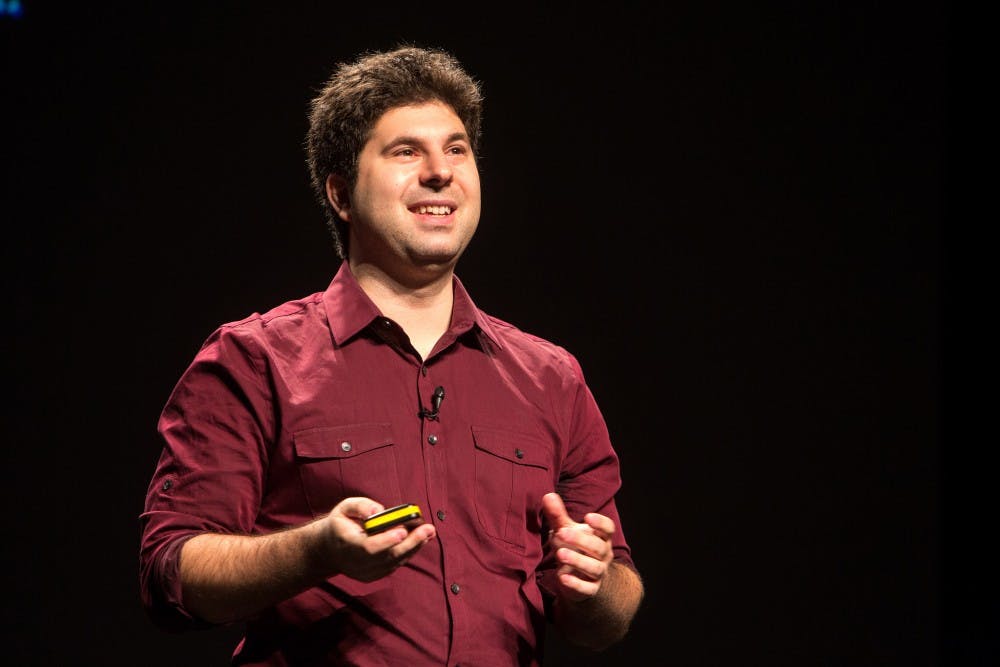
Positive psychology professor Scott Barry Kaufman just released his book, "Wired to Create: Unraveling the Mysteries of the Creative Mind," which focuses on the psychology of creativity. | Photo by PopTech/Wikimedia Commons
The mental clockwork allowing the Picassos, Mozarts and Einsteins of the world to create, imagine and dream has long been shrouded in mystery — until now.
Positive Psychology professor Scott Barry Kaufman recently released a book called "Wired to Create: Unraveling the Mysteries of the Creative Mind." The book explores the cognitive psychology of creativity and the practices of creative people — topics that are intrinsically connected to Kaufman. Apart from teaching psychology and directing Penn's Positive Psychology Center’s Science of Imagination Project, he is a gifted cellist, opera singer and hip-hop dancer.
In his book, he mentions that society has a habit — although sometimes unintentional — of penalizing creative people and looking at them as trouble-makers because of their nonconformist nature. He emphasizes the importance of creating a fostering environment where creativity can grow — especially in schools.
He said that one of the book's most profound ideas that the public may not have thought about before is that creativity is multifaceted.
“A lot of people think in terms of dichotomies — like you’re either extraverted or introverted, or you’re either sensitive or tough or you’re mindful or a daydreamer,” Kaufman said. “And I think in this book, people will be surprised to see that creativity requires embracing these seeming contradictions and requires bringing together various seeming incompatibilities and reconciling it through the creative process.”
Kaufman’s work, in both performing arts and cognitive psychology, stems from his early childhood experiences.
“I was a kid growing up in a special education classroom with an auditory learning disability. I felt as though my friends who were in special education with me were capable of a lot more than people gave them credit for in the school system.” Kaufman said. “And I became fascinated at an early age with, 'What is intelligence? What does it take to achieve in life?'"
He discovered his love for and talent in the performing arts during high school after a ninth grade teacher understood his frustration at being labeled and encouraged his ability to succeed and pursue different activities. Kaufman excelled in the school choir and orchestra and asked his grandfather — who was a member of the Philadelphia Orchestra— to teach him to play the cello.
After high school, Kaufman originally applied to Carnegie Mellon’s psychology department with an application essay on the subject but was rejected. However, he reapplied to the same school’s voice program for opera and was accepted.
At Carnegie Mellon, Kaufman’s eyes were opened his sophomore year when he took a cognitive psychology course and read a chapter about intelligence from his textbook. He was enthralled by the different ways intelligence went beyond just IQ scores and realized that cognitive psychology was a field he wanted to pursue.
Graduating with a doctoral degree from Yale in 2009, Kaufman has gone on to become a leader in cognitive psychology — authoring several books and creating a dual-process theory of intelligence that emphasizes the importance of including spontaneous cognition and personal goals and engagement, instead of only focusing on rational thought when measuring intelligence.
The Daily Pennsylvanian is an independent, student-run newspaper. Please consider making a donation to support the coverage that shapes the University. Your generosity ensures a future of strong journalism at Penn.
DonatePlease note All comments are eligible for publication in The Daily Pennsylvanian.








